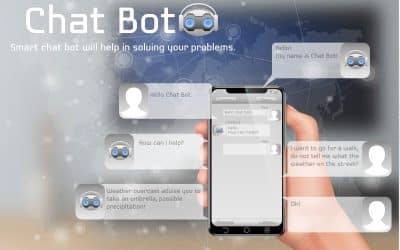In the ever-changing technological world, artificial intelligence (AI) has become a revolutionary technology that is transforming how we work and altering how we communicate with our environment. The complexity and costs of developing and implementing have often hindered access to businesses and other organizations. This is where AIaaS (Artificial Intelligence as a Service) comes in and offers an exciting approach to democratizing AI, making it accessible to a larger audience. AI has often been an obstacle for businesses when negotiating. It has been necessary to cope with the challenges of creating AI systems. This usually requires a complete revamp of the infrastructure and the requirement to train, hire, or upgrade employees’ skills.
AI-as-a-Service Solutions provides an incredibly practical, easy, effective, and straightforward option for anyone seeking to adopt technology to benefit from artificial intelligence in business. It’s also not just something we’d like; it’s expected to become an essential business feature. We’ll dive in to discover the reasons and ways to achieve it!
Understanding AI-as-a-Service
AIaaS, also known as AI-as-a-Service, is a cloud-based approach that gives businesses the ability to access AI capabilities. Most importantly without the requirement to build an in-house IT infrastructure, develop software, or hire specialist expertise. It eases the process of using AI by providing built-in AI tools, algorithms, and other services that are used and accessed via the web or API.
With AIaaS, an organization can access a range of pre-built AI solutions provided by other third-party AI service providers and easily modify and expand the solutions they create. This aligns with the cloud-based as-a-service model, which allows businesses to access the most advanced technology and tools at any time. A cloud provider (CSP) makes this access possible. The CSP is accountable for hosting and managing the infrastructure. The CSP generally provides the service to an organization through a month-to-month or annual payment.
Types of AI-as-a-Service
AIaaS is a suite of AI applications and tools that can be used through cloud-based platforms, eliminating physical infrastructure requirements. We’ll explore the different forms of AIaaS and discover their functions and potential applications.
Bots And Digital Assistants
Digital assistants are an increasingly popular form of AIaaS. They allow companies to incorporate functions like chatbots, virtual assistants, and automated email response services. They use neural technology for processing language (NLP) to gain knowledge from human conversation. They are extensively employed in customer service and marketing software.
Application Programming Interface (API)
AIaaS solutions offer APIs to permit software programs to use AI functions. Developers can integrate their apps into AIaaS APIs using just two lines of code. They can also gain access to a range of powerful features. Numerous AIaaS APIs include natural language processing features. For example, they permit an application to send texts via API and perform sentiment analysis, entity extraction, knowledge mapping, and translation.
Other APIs also offer computers with computer vision features. For instance, they let an application display a picture of the user and execute complex tasks like facial recognition, face detection, and object detection. They also allow the ability to search in video.
Machine Learning (ML) Frameworks
Machine learning frameworks are tools AI-as-a-Service Company can use to create custom AI models. However, they are complicated to use and do not offer an entire machine learning operation (MLOps) process. This means that they allow you to create an ML model; however, they require further tools and manual procedures to validate the model before you put it into production.
AIaaS solutions offered as platforms as a service (PaaS) model are completely managed machine learning and deep learning platforms, giving you an entire MLOps procedure. Developers can collect a data set, build a model to develop and test it, and then seamlessly transfer it into production using cloud servers hosted by the service provider.
No-Code or Low-Code ML Services
Fully-managed machine learning solutions offer the same capabilities that machine learning frameworks do. However, they don’t require creators to develop their own AI models. Instead, these AIaaS solutions come with pre-built models, custom-designed templates, and non-coded interfaces. These are ideal for businesses that do not wish to spend money on software development and need to possess the expertise of data scientists on their own.
What Does AIaaS Mean For Businesses?
In combining the power of AI to provide an accessible and user-friendly service, AIaaS could be an opportunity to transform firms. Businesses can use AIaaS to use their data to solve complex problems and provide them with quicker and more precise insights into the market and their customers, which allows them to make better decisions in marketing and business. They can also increase the user experience for customers through improving customer service by automating and personalizing their communications. The capabilities provided by AIaaS solutions could help businesses improve their profits and gain a competitive advantage.
If you’re looking to stay ahead of technology, AI adoption is crucial, and AI-as-a-Service (AIaaS) is a viable solution. Prior to selecting a vendor, be sure to consider the goals you want to achieve, your business’s size, and the budgetary and staff abilities of your staff in order to make the right choice.
Benefits Of AI-as-a-Service
AIaaS is an ideal option to bypass the problems created by internal AI creation (see this article). AIaaS benefits companies seeking access to AI capabilities without costing a fortune. They include:
The Ability To Access The Latest Technology At A Lower Cost
AIaaS has helped make AI much more accessible and more competitive for smaller businesses. Before, ML models demanded expensive equipment with powerful GPUs within sophisticated data centers. However, advancements in cloud computing have allowed companies of all sizes to benefit from the power of AI capabilities and the latest AI solutions at significantly lower costs. Furthermore, using AIaaS means the costs for the development, testing, and implementation of ML models are lower than the in-house development process.
There Is No Need To Have Sophisticated Technical Abilities
The big players such as Amazon, Google, or Microsoft and smaller niche companies offer an array of software and models that have been trained for various scenarios or particular industries such as healthcare, financial services, or even health. That means there is less demand to have a specialist in machine learning.
For example, Flowable is an AIaaS service that automatizes routine tasks within documents, text, and image workflows. A different AIaaS option can be found in Ultimate AI. This chatbot service has a human-like AI that allows companies to create automated emails and calls. Similarly, Viz.ai provides an AI-based platform that helps improve collaboration between healthcare professionals on the frontline and specialists and, in the end, enhances the quality of healthcare given to patients.
Many AIaaS platforms, even in the platform-as-a-service space, provide no-code and low-code solutions that enable companies to quickly add AI capabilities to their applications and modify them as needed without needing AI-savvy developers on staff. Because these tools and platforms are cloud-based, businesses aren’t required to construct or maintain their AI infrastructure, so there will be less need for people with expertise in infrastructure management or MLOps.
Rapider Development Speed
The time to market has also come down through a more straightforward development process. Models with trained, non-code, or low-code options paired with drag-and-drop interfaces and fully functioning out-of-the-box solutions have cut development times from years to months, sometimes weeks, with minimal education and onboarding for staff members involved. However, even when AI is a service, there needs to be a more complicated (less personalized) method of implementing AI and an extended (more personalized) approach.
Scalability And Personalization
Growing AI-as-a-Service Software Solutions is an entirely different issue from creating an actual AI model, requiring different abilities and knowledge. It is good to know that many AIaaS platforms are built to be scalable. This means businesses can adopt and expand AI strategies as their requirements evolve. Additionally, they can increase the size (or down) rapidly and for only a fraction of the expense of an internal AI department.
The scalability of AI-as-a-Service solutions is a significant reason AIaaS is thought to “democratize” the AI landscape. In simple terms, they let smaller businesses access the potential of AI’s powerful, flexible capabilities for a low price to create their own AI solutions and compete against larger competitors within their field.
Improve Your Operations
AIaaS allows businesses to quickly test innovative AI functions and applications that encourage innovation and flexibility and improve existing procedures. This agility is vital in the current business climate, where constant innovation is essential to succeed.
Unlimited Computing Power
Many ML models require large quantities of training data processed through complicated algorithms, so powerful processors and GPUs are required. AIaaS cloud computing can rapidly provide vast amounts of computing power and crucial ML-related services, such as serverless computing and batch processing, to process data and train models. For example, the start-up Stability AI employs a fleet of 4000 GPUs from Nvidia running within AWS to build its AI models.
Cost Control And Transparent Pricing
Large CSPs offer AIaaS using a “pay-as-you-go” pricing model. As organizations pay only for the AI services they require, they can reduce their expenditure on AI. AI as a Service removes the requirement that businesses purchase and maintain costly on-premise systems, thereby decreasing the cost of AI use. Cost efficiency is vital for companies of any size, especially SMEs, which need more financial resources to purchase AI capabilities in their facilities.
Global Reach And Integration
AIaaS platforms typically include support for multiple languages, allowing companies to use solutions worldwide. The majority of AIaaS products are built to seamlessly integrate with business software, reducing the friction of implementation.
AIaaS Developments In 2024 And Beyond
While we constantly find new ways to employ AI to improve customer service, organizations should adopt AI to stay ahead of the market. Below are a few AIaaS developments that you should monitor today and in the coming years. A picture of a human in front of a computer completes the overview of AIaaS patterns.
Human-Like, Natural Conversations
It’s not surprising that 65% of executives believe AI or bots are getting more human and natural because they’re. Artificial intelligence-powered bots draw information from the knowledge collection to create accurate conversations and responses. They can also build a persona for your chatbot to reflect your tone and voice your company’s brand to improve the user experience.
Most consumers are familiar with Alexa, Siri, and Google Assistant and have embraced the ease of using conversational AI. Because bots learn through each interaction, AI interactions can only improve.
More In-Depth Personalization
Customers expect to experience a full-bodied experience whenever they interact with companies. Businesses are aware that they gather data, and according to our CX Trends Report, 59 percent want to utilize data to tailor their experience. AIaaS provides pre-trained bots that use NLP to determine users’ intent and tailor responses to their prior interactions.
Collaboration Is Improved, And Data Silos
Support roles in the traditional sense are evolving, and roles are evolving. Seventy-two percent of executives believe combining groups and responsibilities improves productivity, meaning collaboration across functions and data sharing is essential. AIaaS is a technology platform that allows you to integrate disparate data into one location, eliminate the silos of data, and work effectively.
Machines Are Rising
AI has leapfrogged from sci-fi to reality and is quickly becoming integral to improving employee and customer experiences. Both customers and companies have taken to the new technology and realized that AI-as-a-Service advantages can be vital to remaining innovative and ahead of the curve. Using AIaaS, you can use AI-powered, user-friendly tools to quickly improve your system, fulfill business demands, and beat your competitors.
AI as-a-Service Use Cases
Let’s have a look at some use cases of AI-as-a-Service:
Image Recognition
Image recognition software analyzes images to distinguish locations, individuals, or objects and draw conclusions. Duos Technology utilizes AI-powered systems to automate the examination of trains while they travel along tracks.
Recommendation Engines
They suggest the most pertinent to the customer according to patterns and preferences. It is this way with Taboola, which is continually learning the AI models to give enormously scaled content suggestions. Taboola also provides the proper recommendations. It is used 30 billion times daily on 4 billion web pages that can handle as many as 150,000 requests per second being processed.
Natural Language Processing
NLP systems make use of computer-generated text and speech. The systems interact with clients live in real-time. Converge Technology Solutions assisted an international development bank. It uses AI-driven NLP methods to break down the barriers to communication within an organization. It has 29 offices throughout the Americas and includes four different languages.
APIs
AI APIs are software programs that businesses can access from third-party service suppliers. Conversational AI can be an approach for businesses to design and create experiences that mimic human conversations with digital technology. It helps customers engage and aid sales and customer service agents. Companies can customize customer interaction by bringing consistency to customer experience across channels, improving customer self-service, and increasing lead generation by predicting sales.
Detection Of Fraud
An AI system detects unauthorized banking activity and prevents fraud. MasterCard is the best example of the power of an AI-driven system. The system analyzes every transaction with 1.9 million rules. The system also processes more than 165 million transactions in an hour with the ML algorithm. Everything occurs in milliseconds.
Autonomous Vehicles
Autonomous cars improve security. They use technologies that enable their drivers to perceive, detect, and react to their environment. This is how OTTO Motors systems work. OTTO Motors digitizes material flow. This is achieved by using modern technology for autonomy.
Data Classification
Organizations collect a large amount of data. They require ways of categorizing it, which improves data organization, accessibility, searchability, and retrievability. For example, companies may require that their metadata about media be automatically tagged using AI-as-a-service services to improve data classification.
Challenges Of AI as-a-Service
AIaaS is an effective tool with enormous potential. However, it’s a new technology with unique challenges. Companies must carefully consider their challenges and take steps to reap the maximum benefits from AI as a service as it evolves. The main issues AIaaS has to face, we identify the following issues:
Data Privacy And Security
AIaaS Solutions depend on accessing sensitive information. Businesses should ensure their data is secure and managed by the AIaaS service provider. Privacy regulations for data like GDPR require strict processing practices, and organizations must adhere to the rules to minimize the risk of reputational and legal liability.
Transparency
AI algorithms can be complicated and challenging to grasp and can raise concerns over transparency, fairness, and possible biases within AI algorithms. Business owners must evaluate the credibility of AIaaS products to be sure they comply with their ethical guidelines and policies on data governance.
Vendor Dependence
AIaaS products are usually private, so businesses might rely on just one supplier to fulfill their AI requirements. To reduce dependence on third parties, companies should consider factors like open source alternatives or the adaptability of AI models before implementing AIaaS.
Cost Considerations
Although AIaaS initially reduces initial expenses, the ongoing costs of using and maintaining it can be significant. Businesses must evaluate their long-term cost-of-living expectations and ensure that AIaaS matches their budget goals and ROI objectives.
Let’s Sum Up
AI-as-a-Service has transformed the ways businesses utilize AI capabilities. It provides an accessible and powerful technology for innovating. In removing the requirement for significant investments or in-house experts, AIaaS has democratized the utilization of AI and has enabled enterprises of any size to benefit from its advantages. As AIaaS develops and expands, its potential to transform increases, clearing the way for an era where companies are equipped to make smarter choices, streamline processes, and increase their competitive advantage.
AI-as-a-Service emerges as a pulsing thread linking accessibility, innovation, and efficacy. We are on the edge of a brand new digital age. AIaaS promises to democratize artificial intelligence’s potential and make it a valuable partner for businesses, large and small. AIaaS is not only about computations or algorithms; it’s about creating a more intelligent and connected future that is accessible to everyone.











